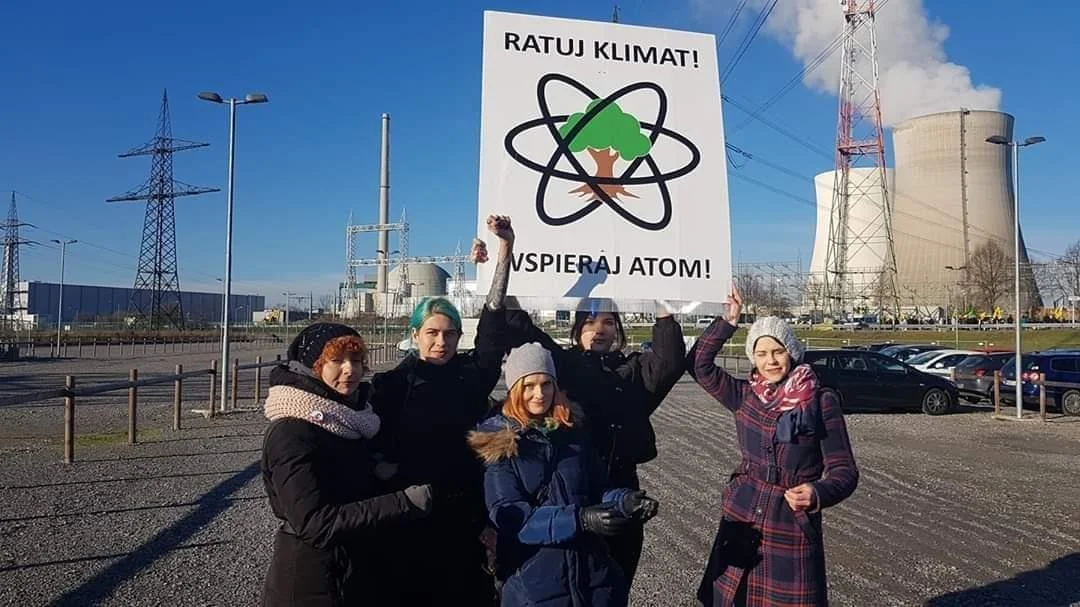Adam Blazowski, Advocate with FOTA4Climate, July '23
Adam Blazowski, a strong advocate for nuclear energy across Europe and in his native Poland, which receives the bulk of their electricity from coal generation. He considers himself an eco-humanist, wanting to protect nature while elevating humanity.
Meet Adam Blazowski, the nuclear activist fighting for cleaner air in Europe’s most polluted country
Adam Blazowski lives in the dirtiest country in Europe. As a lifelong environmentalist, he is on a mission to help transition Poland off of fossil fuels and onto clean nuclear energy.
Getting 79% of their electricity from fossil fuels, and 69% from coal alone, Poland faces a long battle in their efforts to decarbonize.
Due in large part to Blazowski’s work with FOTA4Climate advocating for nuclear energy in the country, public support of nuclear energy skyrocketed in recent years and stands among the highest in the world.
The government plans to build 6 large pressurized water reactors with a combined capacity of 6-9 gigawatts by 2040. One gigawatt is enough energy to power about 750,000 homes. They signed a deal in 2022 with nuclear manufacturing company Westinghouse to build an AP1000, one of the most advanced reactors in the world with increased efficiency, digital controls, and simplified plant design, to begin construction in 2026.
While 75% of Poles support nuclear, a small, vigorous anti-nuclear environmental opposition exists. In 2018, anti-nuclear greens expelled Fota4Climate from a climate march, and German anti-nuclear physically attacked the group, Blazowski said.
Considering himself an eco-humanist, Blazowski, a FOTA4Climate board member, said he believes in eco-humanistic evidence-based protection of nature and people. In addition to supporting nuclear, Fota4Climate advocates reducing agriculture’s environmental impact through precision fermentation, stopping deforestation, and protecting marshes and wetlands.
According to Blazowski, Polish people overwhelmingly support nuclear energy because of the omnipresence of coal pollution as well as nuclear’s ability to secure energy independence.
“People see coal power plants from their windows. They see coal is no longer feasible. They see nuclear power as a natural replacement,” Blazowski said. “It is a technology that makes you rich and independent. They don’t want to be dependent on Russian fossil fuels.”
Blazowski attributed new nuclear construction in Central and Eastern Europe to the desire to be energy independent as the fear of Russian invasion and colonization looms.
Members of FOTA4Climate protest the pre-mature closure of Phillipsburg Nuclear Plant in Germany, in December, 2019.
Before becoming a nuclear activist, Blazowski worked for many years in energy efficiency, controlling heating systems in buildings to reduce emission and natural gas consumption. At the time, he felt proud of his contribution to the climate effort.
While Blazowski was already passively pro-nuclear, it wasn’t until in 2016, when he heard Belgium planned to close nuclear plants and replace them with natural gas plants, that he decided to become a nuclear advocate and fight for the technology.
“I was really mad. We do all this heavy work to reduce the CO2 emissions. And then some stupid green politicians are taking absolutely disastrous decisions in Belgium, where they build new natural gas plants because they're closing nuclear,” Blazowski said. “I said, we have to do something about this.”
FOTA4Climate hosted and attended several pro-nuclear events across Europe starting in 2019. The group protested the closure of Phillipsburg Nuclear Plant in Germany in December 2019. As a result of Fota4Climate’s protest, the German pro-nuclear voices emerged with a strong pro-climate position, becoming legitimized in the public discourse.
In terms of domestic achievements, Fota4Climate convinced many environmentalists and nature conservancy activists that nuclear energy spares nature, according to Blazowski. With the smallest land footprint per unit of energy produced, nuclear energy can preserve wild spaces and produce vast amounts of energy.
Many of these ideals are encompassed by the mission of the alliance of NGOs, RePlanet, constituting a movement of eco-humanistic people that want to “liberate nature and elevate humanity.” Blazowski serves as chairman of the supervisory board.
With the support of, as Blazowski put it, “everyone and their mother,” Poland aims to construct nuclear energy at large scale, with the first reactor slated to enter commission in 2033.
In an effort to gain the support of environmentalists, some of whom are anti-nuclear, within the country, Fota4Climate has lobbied the government to create one national park per reactor built. Such a national park would be the first in over 25 years.
“We can build reactors and spare and protect nature in the same move,” Blazowski said. “This is a completely new way of talking about nuclear.”


